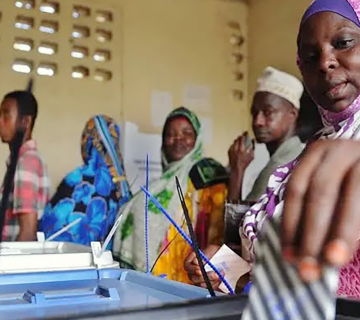Mass disinformation and mal-information are threats to national security. Both ‘dis’ and ‘mal’ information are especially severe in open and liberal democracies such as Kenya. Misinformation is the unintentional circulation or publishing of false information. Disinformation is the deliberate circulation or publishing of false information to contort a discourse, deceive, or harm individuals, organizations, society, or the nation. Malinformation typically involves the deliberate use of accurate information to mislead, harm or contort a discourse, a nation, a community, or an individual. All three—‘dis’, ‘mis’, and ‘mal’– information pose significant challenges to democratic institutions, public trust, and social cohesion in Kenya.
Historically focused on traditional national security threats, intelligence agencies are increasingly called upon to address the changing landscape of national security threats that now involve widespread ‘dis’ and ‘mal’ information. In what is a welcome departure from the past, Kenya’s National Intelligence Agency (NIS) is demystifying intelligence by opening up and engaging the public more openly, as evidenced by the recent public appearances and lectures from and by the security agency’s top leadership.
Noordin Hajji, National Intelligence Service Director-General, most recently delivered the inaugural lecture at the National Intelligence and Research University on the threats and opportunities in the evolving security landscape and elaborated on a range of security dynamics affecting the country, the region, and the globe. ‘Dis’ and ‘mal’ information, stated the DG NIS, has become a significant security issue. Coupled with terrorism, violent extremism, ethnicization of conflicts, politicization of ethnicity, corruption, and new technologies, among others, the major security risks with a ‘high degree of randomness,’ continue to unravel, the DG stated.
The DG NIS noted that professional intelligence agencies worldwide are now adopting measures that balance secrecy and openness to address modern security threats such as terrorism and violent extremism without compromising operational effectiveness.
The Dis-Mis-Mal (DISMAL) Information Threat Triad
Cybersecurity, disinformation, misinformation, and malinformation now consitute key threats to natioanl security. Unchecked, they could easily lead to an implosion in any open, liberal and democratic country. The fast-paced nature of digital communication means that disinformation and malinformation tactics are constantly evolving. Intelligence agencies must remain agile and adaptable to keep pace with new methods and technologies used by malicious actors. Massive misinformation, disinformation and malinformation have a radicalizing effect on misinformed populace, and a destabilizing effect on the nation’s fabric, posing a serious threat to national security.
During, on, or around super-charged election campaigns, a small incident could implode a disinformed and malinformed nation rooted murky tribal and transactional political discourse and practice. Artificial Intelligence (AI) with a ‘sterodizing’ effect on the social media, transforms it into a destructive (mal)informational behemoth.
While it is extremely difficult to control and end the current spate of disinformation and malinformation, there are still ways to minimize their negative impact on national security and stop the threat of an implosion.
Kenya’s Socio-Political Landscape
While platforms like Facebook, X, Instagram, Tiktok, and WhatsApp have empowered citizens to engage in dialogue and share information, they have also become breeding grounds for political disinformation, malinformation, hate crimes, xenophobia, and the spread of deepfakes. These challenges, amplified during election cycles, undermine social cohesion, erode trust in democratic institutions, and pose a risk to national security.
Political disinformation and malinformation in Kenya has often taken the form of distorted narratives designed to favor specific political actors or discredit opponents. During the previous general elections, false claims circulated widely, fueling ethnic tensions and deepening societal divisions. Hate speech targeting ethnic groups and communities has also flourished during such politically-charged times. Now, with social media on steroids, the incitements are no longer limited to offline audiences, but now more online.
In 2024 and 2025, this narrative has transformed into an intergenerational problem. On social media, this rhetoric has fueled online confrontations, intergenerational and class-based discrimination, and animosity, creating a fertile ground for offline tensions transferred into the physical space.
Perhaps it is the urgent realization that unchecked; a ‘dismal’ informed nation can implode without warning. To effectively counter malinformation and disinformation, the National Intelligence Service can do the following;
- Facilitate rapid responses to disinformation and malinformation Timely intelligence sharing can help identify and mitigate threats before they escalate.
- Establish or trigger the establishment of fact-checking initiatives as well as collaborating with independent fact-checking organizations to enhance the credibility of information disseminated espcailly through social media.
- Work with social media companies to develop algorithms and tools that identify and flag disinformation. This collaboration can include sharing insights on emerging threats and best practices for content moderation.
- Share information and establish platforms for information sharing among intelligence agencies, law enforcement, and technology companies
- Provide regular updates on their efforts to combat false narratives, share findings from their analyses, and offer guidance on recognizing misleading information.
- Invest in training programs for personnel to enhance their understanding of malinformation and disinformation.
- Advocate for policies that promote transparency and accountability in information dissemination can help create an environment less conducive to the spread of disinformation.
- Establish, or help establish counter-disinformation and counter-malinformation initiatives.
Even at the risk of the National Intelligence Service facing certain challenges in its attempt to balance secrecy and openness, recent open engagement is a welcome departure from the past. It is bound to create more trust and engender the notion of shared security amongst the citizens of Kenya—that our collective well-being and vulnerabilities are intertwined and shared and can be addressed with deeper participation from the citizens of the republic. After all, safe, secure, and sustainable countries start with well-informed citizens with up-to-date, accurate, and authentic information.
Dr Yusuf Ali is a Associate fellow at the Horn Institute
Photo Credits: Ministry of Defence, Kenya and Ahmed Mohamed (@AsmaLi on X)



